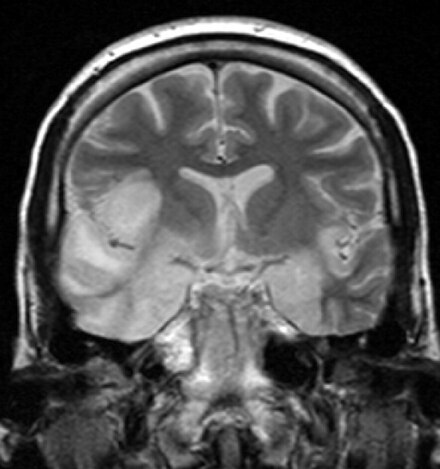Encephalitis
Encephalitis is inflammation of the brain, with variable severity. Symptoms often include reduction or alteration in consciousness, headache, fever, confusion, stiff neck, and vomiting. Complications may involve seizures, hallucinations, trouble speaking, memory issues, and hearing problems.

Causes
The aetiology of encephalitis includes infections by viruses such as herpes simplex virus, rabies virus, and bacteria, fungi, or parasites. Autoimmune diseases and certain medications can also be causes. Notably, 30%-40% of encephalitis cases have an unknown cause.
Viral Causes
Viral infections are the usual culprits, either as a direct effect of an acute infection or as sequelae of a latent infection. Common identifiable viral causes include herpes simplex, rabies, poliovirus, and measles virus. Arboviral flavivirus (e.g., West Nile virus), bunyavirus (La Crosse strain), reovirus (Colorado tick virus), and henipavirus infections are additional possibilities. The Powassan virus is a rare cause.
Bacterial and Other Causes
Bacterial infections such as bacterial meningitis or complications from syphilis can lead to encephalitis. Parasitic infestations like toxoplasmosis, malaria, or primary amoebic meningoencephalitis can cause encephalitis in immunocompromised individuals. Lyme disease and Bartonella henselae are other potential bacterial pathogens.
Limbic and Autoimmune Encephalitis
Limbic encephalitis affects the limbic system, presenting with disorientation, memory loss, and behavioural anomalies. Autoimmune encephalitis, such as anti-NMDA receptor encephalitis, can include catatonia, psychosis, and abnormal movements.
Encephalitis Lethargica
Characterised by high fever, headache, and lethargy, encephalitis lethargica's cause is unknown. An epidemic from 1917 to 1928 affected people globally.

Signs and Symptoms
Adults typically present with fever, headache, confusion, and sometimes seizures. Children may show irritability and poor appetite. Neurological exams often reveal drowsiness or confusion and a stiff neck, indicative of meningitis or meningoencephalitis.
Diagnosis
Diagnosis involves identifying decreased or altered consciousness, lethargy, or personality change lasting at least 24 hours without another explainable cause. Diagnostic methods include:
- Brain Scan (MRI): Determines inflammation and differentiates from other causes.
- EEG: Monitors brain activity, showing abnormal signals in encephalitis.
- Lumbar Puncture (Spinal Tap): Tests cerebrospinal fluid for signs of infection.
- Blood and Urine Tests
- PCR Testing of Cerebrospinal Fluid: Detects viral DNA.

Treatment
Treatment is based on supportive care and includes:
- Antiviral Medications: For viral causes.
- Antibiotics: For bacterial causes.
- Steroids: To reduce brain swelling.
- Sedatives: To manage restlessness.
- Acetaminophen: For fever.
- Occupational and Physical Therapy: Post-infection rehabilitation.
Pyrimethamine-based maintenance therapy is used for toxoplasmic encephalitis, particularly in immunocompromised individuals. HAART therapy decreases the relapse rate in HIV patients. The effectiveness of intravenous immunoglobulin for childhood encephalitis remains unclear, though it may benefit certain forms.
Prognosis
Poor prognostic factors include cerebral oedema, status epilepticus, and thrombocytopenia. Conversely, a normal encephalogram early in diagnosis suggests a higher survival rate.
Epidemiology
The incidence is about 7.4 cases per 100,000 people per year in Western countries and 6.34 per 100,000 in tropical regions. Approximately 250,000 cases occur annually in the US. In 2015, encephalitis affected 4.3 million people and resulted in 150,000 deaths globally. Herpes simplex encephalitis has an incidence of 2–4 per million per year.

Self-assessment MCQs (single best answer)
What is the primary characteristic of encephalitis?
Which of the following is NOT a common symptom of encephalitis?
What type of infection is most commonly associated with encephalitis?
Of these, which virus is the rarest cause of encephalitis?
Limbic encephalitis primarily affects which part of the brain?
What diagnostic method is used to test cerebrospinal fluid for signs of infection in encephalitis?
What is the mainstay of treatment for viral encephalitis?
What is a poor prognostic factor for encephalitis?
Approximately how many cases of encephalitis occur annually in the United States?
Which demographic is more likely to show irritability and poor appetite as symptoms of encephalitis?
Dentaljuce
Dentaljuce provides Enhanced Continuing Professional Development (CPD) with GDC-approved Certificates for dental professionals worldwide.
Founded in 2009 by the award-winning Masters team from the School of Dentistry at the University of Birmingham, Dentaljuce has established itself as the leading platform for online CPD.
With over 100 high-quality online courses available for a single annual membership fee, Dentaljuce offers comprehensive e-learning designed for busy dental professionals.
The courses cover a complete range of topics, from clinical skills to patient communication, and are suitable for dentists, nurses, hygienists, therapists, students, and practice managers.
Dentaljuce features Dr. Aiden, a dentally trained AI-powered personal tutor available 24/7 to assist with queries and provide guidance through complex topics, enhancing the learning experience.
Check out our range of courses, or sign up now!


